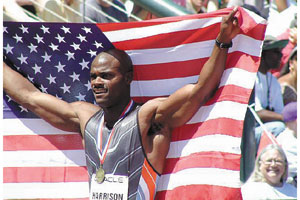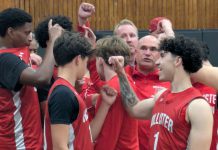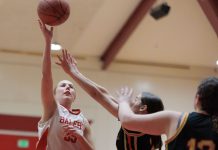
Hollister resident Alvin Harrison, an Olympic gold medalist who
also served a four-year ban in 2004 for admitting to using
performance-enhancing drugs, will lead the Gilroy High track and
field team in 2011, Gilroy High School Athletic Director Jack Daley
announced last Tuesday.
Kyte.Embed.path=”http://media.kyte.tv”;Kyte.Embed.altpath=”http://www.kyte.tv”;window.kyteplayer=new Kyte.Player(“”,{appKey:”default”,width:320,height:260,p:”s”,s:1127487,tbid:”21″});
GILROY
Hollister resident Alvin Harrison, an Olympic gold medalist who also served a four-year ban in 2004 for admitting to using performance-enhancing drugs, will lead the Gilroy High track and field team in 2011, Gilroy High School Athletic Director Jack Daley announced last Tuesday.
Harrison, who has been living in Hollister since September, takes over the position from Jeff Myers and takes over a team that had a banner year in 2010. The Mustang girls earned the league championship for the first time in 21 years, while the boys’ fourth-place finish in the team competition at the Central Coast Section Championships supplied them with their first podium appearance since 1982.
“I’m just really excited,” said Harrison, who helped lead the North Salinas Vikings to a section championship in 1993 alongside his twin brother, Calvin.
“The opportunity is great and it will fill that void I was feeling,” Harrison added. “I just want to give back and help out the younger kids.”
Harrison was part of two United States Olympic teams that won gold in the 1,600-meter relay in 1996 and 2000.
However, Harrison’s career hit rock bottom in 2004 when he accepted a ban from the sport after admitting to using performance-enhancing drugs, although he never tested positive.
In 2008, Harrison was stripped of the gold he won in 2000 but still owns the 1996 gold and an individual silver medal he garnered in the 400 at the 2000 Summer Games.
“It was something that happened. It was part of life and an unfortunate experience,” Harrison said. “It was a learning experience. I don’t think that will have any impact on what I do with the kids, at all.”
After the ban expired in 2009, Harrison became a citizen of the Dominican Republic. He raced in a couple events, including the 2010 IAAF World Indoor Championships in March 2010.
“We brought it up (in the interview process) and had very frank and up-front discussions about it,” Daley said of the 36-year-old. “He was very open and honest about it and we were satisfied that it is an area of his life that he has learned from and has moved on. He served his punishment and I think he understands his role as a high school coach.”
Principal Marco Sanchez echoed the endorsement of Harrison and said he looks forward to watching the new coach hand down what he has learned to the athletes.
“He will impart his wisdom from his journey and use it as a positive,” Sanchez said. “He interviewed very well. There are always people who want to give back to the institutions that produced them. And in Alvin’s case it’s the public school system.
“He will influence the next generation of the sport and we are the beneficiaries of that.”
Harrison is the chief executive officer of Track Factor, an athletic company located in the Dominican Republic.
Daley said he recognized immediately the impact Harrison will bring to the program.
“I just really liked his passion for the sport and communicating his knowledge,” he said.









